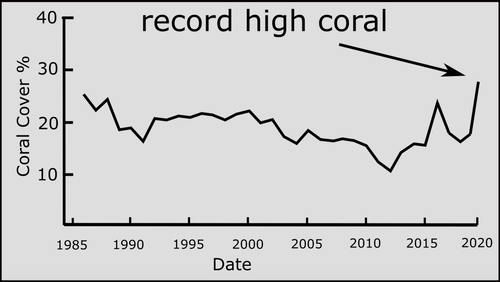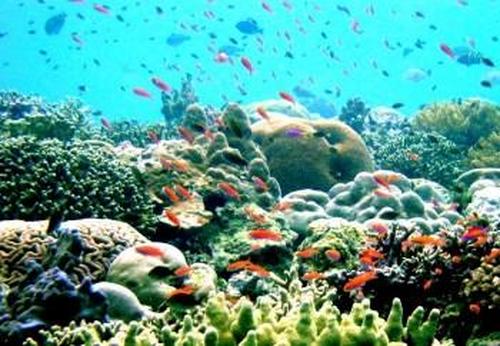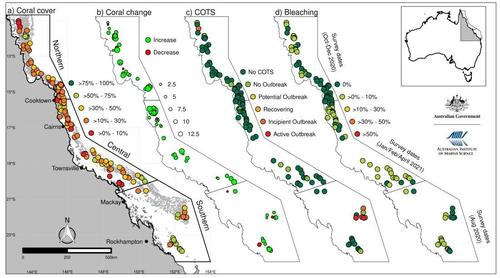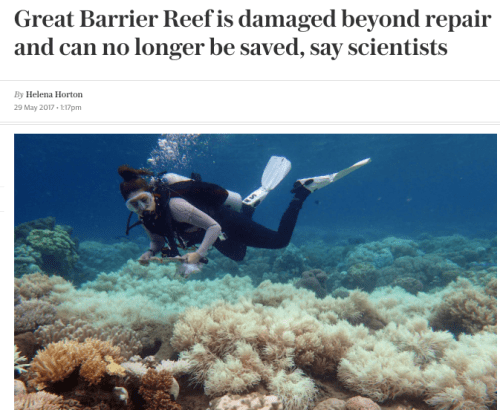Remember Global Warming and the mass dying of corral reefs? It wasn t so long ago.
Then, I started diving all over the world and saw no dying whatsoever! Everywhere healthy reefs, except where polluted or overfished.
In fact, reefs do bleach and die... then they recover as everything in nature. They have done this through ice ages, extremely warm periods, asteroids... for ages. In Papua New Guinea, the waters are above 32C, volcanoes are erupting and dreadfully polluting the waters with toxic chemicals... to no avail. The corals are splandid!
Some parts of the world are over-populated, others are polluted. Temperatures are rising slightly but for all we know, it takes one large eruption to see snow in lower lattitudes in the US or Europe in August. The seas have been rising by a millimeter or two for the last 10,000 years, since the last ice age when they were historically low. And in Japan, near where I live, I find shells, not fossils, deposited 50 to 80m above the current sea level. That s another 40,000 years at the current pace! Even taking into consideration the fact that the coast is been pushed up by earthquakes, that is still 20,000 years. We will have another ice age long before that.
But i disgress. We are talking about reefs. Here is the data:
Authored by Peter Ridd via ClimateChangeDispatch.com,
The annual data on coral cover for the Great Barrier Reef, produced by the Australian Institute of Marine Science, was released on Monday showing the amount of coral on the reef is at record high levels.
Record high, despite all the doom stories by our reef science and management institutions.
Like all other data on the reef, this shows it is in robust health.
For example, coral growth rates have, if anything, increased over the past 100 years, and measurements of farm pesticides reaching the reef show levels so low that they cannot be detected with the most ultra-sensitive equipment.
This data is good news. It could hardly be better
This data series, which started in 1985, is taken from the Australian Institute of Marine Science’s yearly long-term monitoring of the Reef. Source: Peter Ridd
But somehow, our science organizations have convinced the world that the reef is on its last legs. How has this happened?
One reason is that occasionally colossal amounts of coral are killed, mostly by cyclones, but also by the crown of thorns starfish and bleaching.
So the media, with its predilection for bad news, can be fed a regular diet of doom. Our scientists are always happy to oblige.
The quiet recovery is generally downplayed or ignored.
I was working at AIMS when this important work started, and it is interesting to look back on what has changed.
The coral cover is no less, the number of starfish is no more, but the number of scientists and managers working on the reef has exploded. Perhaps this is the problem.
In 50 years we have now learned a great deal about the cycles of coral death and regrowth. The data reported every year by AIMS shows all areas go through these cycles every decade or two.
The science institutions have been claiming that there have been three disastrous bleaching events in the past five years, which does not accord with the latest statistics.
Record coral cover means there was no disaster on the reef. The only disaster is the quality assurance at the science organizations.
An examination of the data shows that, while there have been three events, they occurred in largely different regions in each year. The reef has thus effectively had one major bleaching event in the past five years and the previous major event was in 2002.
Luckily, we have the AIMS long-term coral monitoring surveys, which are done professionally with good-quality protocols, to demonstrate the state of the reef.
The bad news is that the record high coral cover means it is likely that coral cover will decline in the next few years.
Prepare for the headlines saying the reef has lost much of its coral and is indicative of climate change and farmers polluting the reef. And the reef will be predicted to be gone by 2050 – or whenever.
When will these doom stories about the reef, which have been going for 50 years, cease? Will it be like the Ancient Greek legend of Prometheus, who was chained alive to a rock so that his liver could be eaten by an eagle, only for the liver to grow overnight so that it could be eaten again and again? Will the agony ever end?
According to legend, Heracles saved Prometheus. Who will be our Heracles, and support a better quality assurance of the science?
It should be the Great Barrier Reef Marine Park Authority, but so far it has not been interested. The various ministers could also take an interest.
In the meantime, don’t forget we have record-high levels of coral. It is time to stop scaring the children with doom stories about the reef.






No comments:
Post a Comment